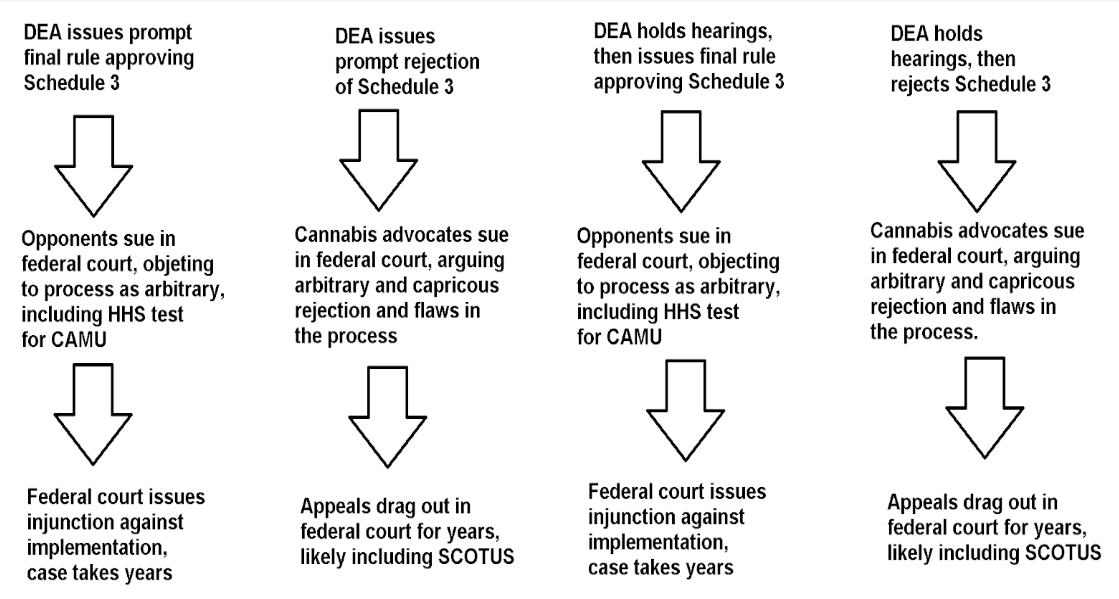In This Article
- Will the Trump Administration Move Forward With Cannabis Rescheduling?
- What Options Remain for Rescheduling?
- Could Schedule 3 Still Be Finalized in 2025?
- Proponents Likely Didn't Delay the Rescheduling Outcome
- Rescheduling Proponents' Long-Term Strategies
- Is Moving Cannabis to Schedule 3 Even a Good Idea?
The administrative hearings on cannabis rescheduling, initially set to commence on January 21, 2025, have been indefinitely postponed.
The hearing was delayed after pro-cannabis hearing participants accused the DEA of:
- bias, particularly in the selection of witnesses, which they claim favored negative testimonies over positive ones
- improper ex parte communication with anti-cannabis organizations like Smart Approaches to Marijuana, and
- improper exclusion of pro-cannabis stakeholders from participation.
In response to these concerns, DEA Chief Administrative Law Judge John J. Mulrooney granted an interlocutory appeal, effectively pausing the proceedings for at least 90 days (probably longer).
During this pause, chief administrator Anne Milgram's vacancy was filled by Derek Maltz, who is now acting administrator until the position is permanently filled, potentially by cannabis opponent Terry Cole.
Will the Trump Administration Move Forward With Cannabis Rescheduling?
On April 4, 2025, the Office of National Drug Control Policy released the Trump Administration's first-year drug policy priorities. The list included addressing the opioid crisis and combating drug trafficking, but had no mention of cannabis rescheduling.
This suggests that despite Matt Gaetz's claim that President Trump supports rescheduling, there is no plan to do so any time soon.
What Options Remain for Rescheduling?
The Trump Administration is now tasked with deciding whether to:
- Halt the rescheduling process
- Reject rescheduling outright
- Dismiss the bias claims and continue with the hearings, or
- Finish the process quickly and issue the final rule
Many believe that the rescheduling process will be halted because Maltz and Cole have expressed anti-cannabis opinions in the past.
Could Schedule 3 Still Be Finalized in 2025?
It's possible, but increasingly unlikely. Regardless of whether DEA decides for or against rescheduling, the final decision will likely be challenged in federal court.
Nebraska's AG Mike Hilgers is leading 11 states in a coalition to fight rescheduling, saying rescheduling is "unlawful and ill-advised" in a 40 page document explaining their legal objections. That inevitable case could take years to decide simply given the slow pace of the judicial process.
If rescheduling is approved, the court is almost certain to issue an injunction against implementation while the opponents' appeal plays out. The state arguments for irreparable harm may be seen as too plausible to a conservative court, even if the cannabis community doesn't see them as reasonable.
Opponents will argue public safety risk, increase in mental health disorders, increase in criminal activity, and more. This is not to imply that these arguments are valid, only that they will be considered reasonable enough by conservative courts to issue an injunction.
Proponents Likely Didn't Delay the Rescheduling Outcome
(so rescheduling supporters can stop chucking rotten fruit at them)
It was always highly unlikely that rescheduling would be completed before the end of the Biden administration.

Rescheduling Proponents' Long-Term Strategies
Village Farms International, Hemp for Victory, OCO, and company are strategizing to ensure the record will be complete and positive enough to win in the inevitable federal appeal.
They are doing so by ensuring the rescheduling hearing deck isn't stacked with only anti-cannabis witnesses.
Ensuring fairly distributed testimony requires a sacrifice in time on the front end to survive the entire federal appeal process on the back end. The federal courts will depend on the facts presented in the rescheduling hearing to make their decision.
In other words, rescheduling proponents are going after the long dime, not the short nickel.
Any rushing of this case would ultimately be a rush rejection at the federal appeals level, especially since the testimony in the current hearing lineup appears to lean heavily anti-cannabis.
This happened before. Alliance for Cannabis Therapeutics v. DEA (1994) demonstrated the importance of a robust and positive record at the administrative level to avoid defeat in the federal circuit. The case also demonstrates the long timeline proponents face because it began in the 80s and wasn't settled till '94.
Is Moving Cannabis to Schedule 3 Even a Good Idea?
Most people want to know if rescheduling can still happen soon. A better question to ask is whether consumers, patients, and cannabis businesses will receive a net positive benefit from rescheduling. There are a lot of caveats that aren't being considered.
We're likely to see potentially industry-killing hurdles in exchange for promised tax breaks:
- National tracking and limits on production to comply with international treaties.
- Federal registration and restrictive requirements for prescribing doctors.
- Registration of telehealth companies that allow scheduled drug prescriptions.
- Costly patent battles.
- Increased federal enforcement against otherwise state-legal businesses.
Suffice it to say Schedule 3 comes with a lot of unintended consequences.
Learn more about cannabis laws and regulations, and sign up for NuggMD's Weekly Sesh newsletter for consumer stories, tips, and analyses on how changing regulations may impact patients.
The information in this article and any included images or charts are for educational purposes only. This information is neither a substitute for, nor does it replace, professional legal advice or medical advice, diagnosis, or treatment. If you have any concerns or questions about laws, regulations, or your health, you should always consult with an attorney, physician or other licensed professional.




